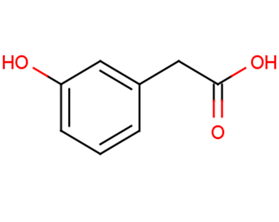
3-Hydroxyphenylacetic acid
CAS No. 621-37-4
3-Hydroxyphenylacetic acid( —— )
Catalog No. M19649 CAS No. 621-37-4
3-Hydroxyphenylacetic acid is a rutin metabolite and an antioxidant. It has a protective biological activity in human.
Purity : >98% (HPLC)
 COA
COA
 Datasheet
Datasheet
 HNMR
HNMR
 HPLC
HPLC
 MSDS
MSDS
 Handing Instructions
Handing Instructions
| Size | Price / USD | Stock | Quantity |
| 100MG | 38 | In Stock |


|
| 200MG | Get Quote | In Stock |


|
| 500MG | Get Quote | In Stock |


|
| 1G | Get Quote | In Stock |


|
Biological Information
-
Product Name3-Hydroxyphenylacetic acid
-
NoteResearch use only, not for human use.
-
Brief Description3-Hydroxyphenylacetic acid is a rutin metabolite and an antioxidant. It has a protective biological activity in human.
-
Description3-Hydroxyphenylacetic acid is a rutin metabolite and an antioxidant. It has a protective biological activity in human. It is a substrate of enzyme 4-hydroxyphenylacetate 3-monooxygenase [EC 1.14.13.3] in the pathway tyrosine metabolism. 3-Hydroxyphenylacetic acid is found to be associated with phenylketonuria which is an inborn error of metabolism.
-
In Vitro——
-
In Vivo——
-
Synonyms——
-
PathwayOthers
-
TargetOther Targets
-
RecptorOthers
-
Research Area——
-
Indication——
Chemical Information
-
CAS Number621-37-4
-
Formula Weight152.15
-
Molecular FormulaC8H8O3
-
Purity>98% (HPLC)
-
SolubilityDMSO: 15 mg/mL
-
SMILESOC(=O)Cc1cccc(O)c1
-
Chemical Name——
Shipping & Storage Information
-
Storage(-20℃)
-
ShippingWith Ice Pack
-
Stability≥ 2 years
Reference
1.Young S N Davis B A Gauthier S . Precursors and metabolites of phenylethylamine m and p-tyramine and tryptamine in human lumbar and cisternal cerebrospinal fluid.[J]. Journal of Neurology Neurosurgery & Psychiatry 1982 45(7):633-9.
molnova catalog



related products
-
Pterosin D
Sesquiterpenoids.
-
1-(3,5-dimethoxy)phe...
1-(3',5'-dimethoxy)phenyl-2-[4''-O-β-D-glucopyranosyl (6→1)-O-α-L-rhamnopyranosyl]phenylethane showed cytotoxic activities to Hela and hep2 cell lines.
-
Alizarin Red S sodiu...
Alizarin Red S sodium (ARS sodium) is an anthraquinone dye. Which has been widely used to evaluate calcium deposits in cell culture.



 Cart
Cart
 sales@molnova.com
sales@molnova.com


